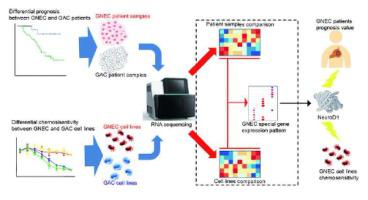Computational and Structural Biotechnology Journal ( IF 6 ) Pub Date : 2020-09-20 , DOI: 10.1016/j.csbj.2020.09.016 Jianwei Xie , Pengchen Chen , Hongteng Xie , Yuqin Sun , Zhen Huang , Ran Wei , Zhengqiang Miao , Qingshui Wang , Shu-Dong Zhang , Koon Ho Wong , Yao Lin , Changming Huang , Hang Fai Kwok

|
Gastric neuroendocrine carcinoma (GNEC) is rare cancer detected in the stomach. Previously, we demonstrated that the poorer prognosis of GNEC patients compared with gastric adenocarcinoma (GAC) patients was probably due to the lack of response to chemotherapy. Thus, it is crucial to study the specific GNEC gene expression pattern and investigate chemoresistance mechanism of GNEC. The transcriptome of GNEC patients was compared with that of GAC patients using RNA-seq. The KEGG analysis was employed to explore the specific differential expression gene function enrichment pattern. In addition, the transcriptomes of two GNEC cell lines, ECC10 and ECC12, were also compared with those of two GAC cell lines, MGC-803 and AGS, using RNA-seq. Comparing patient samples and cell lines transcriptome data, we try to uncover the potential targets and pathways which may affect the chemoresistance of GNEC. By combing all transcriptome data, we identified 22 key genes that were specifically up-regulated in GNEC. This panel of genes probably involves in the chemoresistance of GNEC. From our current experimental data, NeuroD1, one of the 22 genes, is associated with the prognosis of GNEC patients. Knockdown of NeuroD1 enhanced the sensitivity to irinotecan of GNEC cell lines. Our research sheds light in identifying a panel of novel therapeutic target specifically for GNEC clinical treatment which has not been reported before.
中文翻译:

通过转录组和体外分析探索与化学抗性有关的胃神经内分泌癌(GNEC)特定信号通路
胃神经内分泌癌(GNEC)是在胃中发现的罕见癌症。先前,我们证明GNEC患者的预后较胃腺癌(GAC)患者差,可能是由于对化疗缺乏反应。因此,研究特定的GNEC基因表达模式和研究GNEC的化学耐药机制至关重要。使用RNA序列比较GNEC患者和GAC患者的转录组。KEGG分析用于探索特异性差异表达基因功能的富集模式。另外,还使用RNA-seq比较了两个GNEC细胞系ECC10和ECC12的转录组与两个GAC细胞系MGC-803和AGS的转录组。比较患者样品和细胞系转录组数据,我们试图揭示可能影响GNEC化学耐药性的潜在目标和途径。通过组合所有转录组数据,我们确定了GNEC中特异上调的22个关键基因。该基因组可能与GNEC的化学抗性有关。根据我们目前的实验数据,NeuroD1是22个基因之一,与GNEC患者的预后相关。敲除NeuroD1可增强GNEC细胞系对伊立替康的敏感性。我们的研究为确定一组专门针对GNEC临床治疗的新型治疗靶标提供了亮光,而该治疗靶标以前从未报道过。根据我们目前的实验数据,NeuroD1是22个基因之一,与GNEC患者的预后相关。敲除NeuroD1可增强GNEC细胞系对伊立替康的敏感性。我们的研究为确定一组专门针对GNEC临床治疗的新型治疗靶标提供了亮光,而该治疗靶标以前从未报道过。根据我们目前的实验数据,NeuroD1是22个基因之一,与GNEC患者的预后相关。敲除NeuroD1可增强GNEC细胞系对伊立替康的敏感性。我们的研究为确定一组专门针对GNEC临床治疗的新型治疗靶标提供了亮光,而该治疗靶标以前从未报道过。



























 京公网安备 11010802027423号
京公网安备 11010802027423号